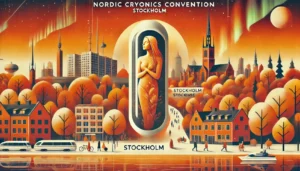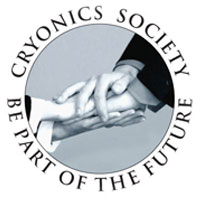
FutureNews
The Latest News from the World of Cryonics and Beyond
Seth McFarlane On Cryonics
Author, Actor and Drector Seth McFarlance talks with Larry King about why he chose to sign up for cryonics,
Ben Best Update
At 6:15 PM, March 12, 2025, as he was pulling into the driveway of his house after dropping my car off at a KIA shop for routine maintenance, longtime cryonics activist and former Cryonics Institute President Ben Best noticed that the dash monitor indicated there was a problem. As he got out of his car, smoke billowed out from under the hood, and the car burst into flames.
A neighbor called the fire department, and neither Ben nor anyone else was injured. The vehicle, however, was completely destroyed. Nonetheless it was a close call, and a timely warning for all those interested in life extension. Life is precarious, and ensuring that one”s cryonics coverage is up to date is well worth doing. All those involved in cryonics, and many beyond, unite in gratitude at Ben’s good health and wish him well.
US Billionaires Bet On Cryonics
“As of now, 5,500 individuals have planned for cryogenic preservation, and 500 bodies are currently in storage”
“In the quest for eternal life, US billionaires are turning to cryonics, the science of freezing bodies with the hope of future revival.
“This radical approach aims to preserve their bodies and wealth, ensuring that when they return to life, their fortunes remain intact, reported Bloomberg. The trend has spurred lawyers to create ‘revival trusts’, a novel legal framework designed to manage and protect the wealth of the cryogenically preserved.”
Read more (or listen to an audio version of the Business Standard article) at:
The Imagery of Cryonics
One of the most important things about cryonics support and acceptance is how people think about it. But what does AI think about it? As we now, AI rests on the concept of Large Language Models (LLMs), and LLMs search through vast databases (including the internet) and feed back the largest, most general and common responses. With that in mind, the Cryonics Society thought it would be an interesting experiment to have ChatGPT create several images of cryonics and how it thinks the public percieves it. Pretty well, apparently. Below are some of ChatGPT’s visual replies.
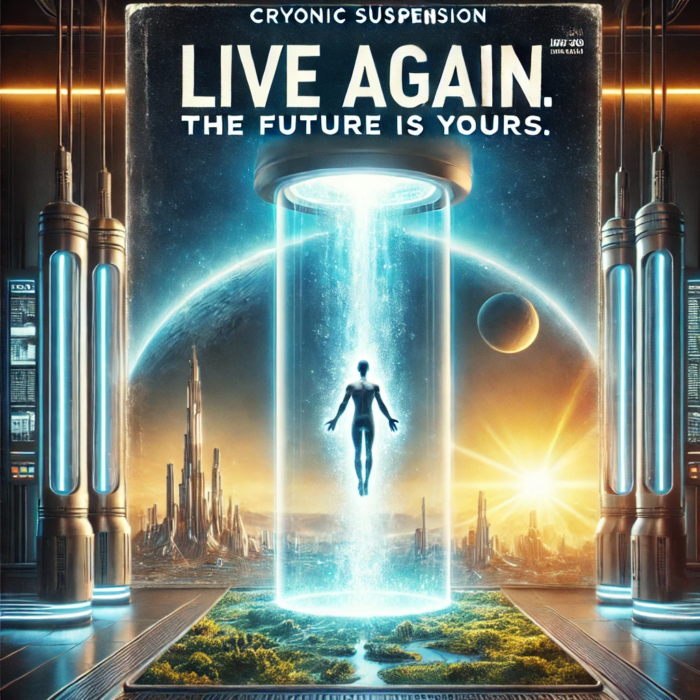

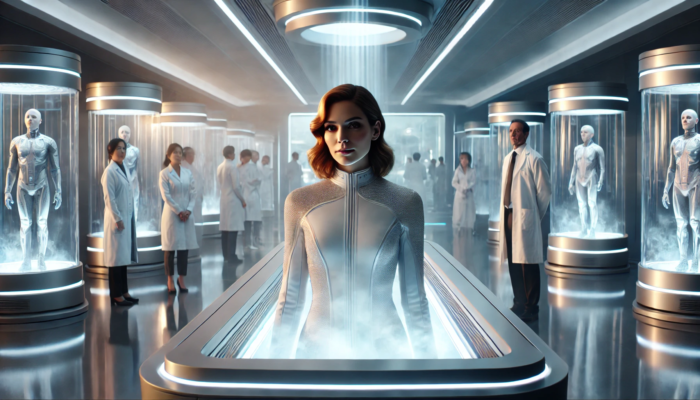
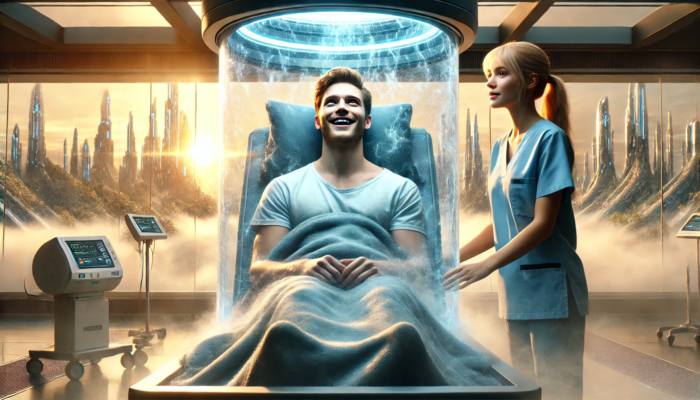

Of course, some products of artificial intelligence are still more artificial than intelligent…
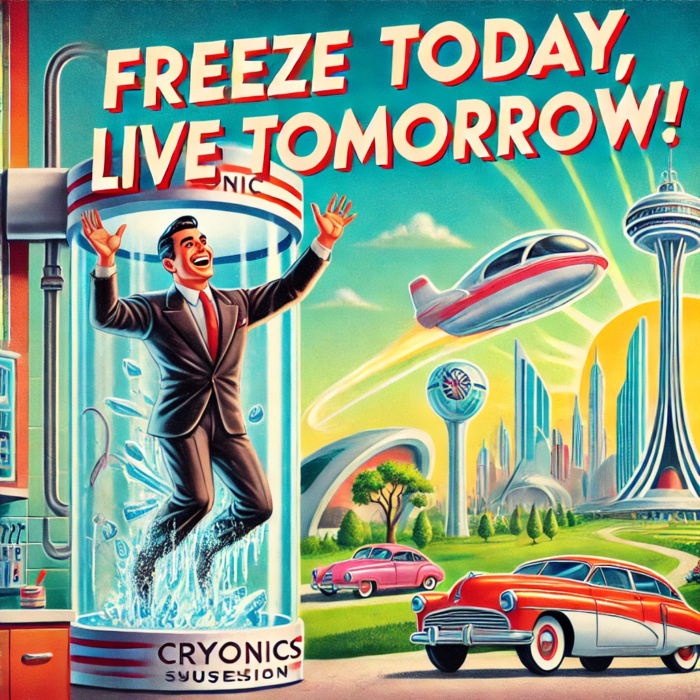
BBC 2025: Overcoming Death for the Price of a Sports Car?
“A German cryonics start-up is offering a chance at a second life for the cost of a sports car. Is cryogenics within reach, or still an empty promise?
“The ambulance parked up by a green in central Berlin is small, almost toy-like; a thick orange stripe across its sides, a tangle of wires looping from the ceiling.
“It is one of three retrofitted and operated by Tomorrow.Bio, Europe’s first cryonics lab, whose mission is to freeze patients after death, and one day bring them back to life, all for a cost of $200,000 (£165,000).”
Read the January 15, 2025 article online at:
Cryogenics and Revival Trusts – Really?
George F. Bearup, J.D., Senior Legal Trust Advisor at Greenleaf Trust, an expert in estate, fiduciary, and tax law, with over 42 years of practical experience as an estate planning attorney, discusses the uses, complexities and promise of Revival Trusts in providing long-term asset protection for cryonics patients in a timely recent article:
31st Space Cryogenics Workshop Scheduled For May 2025
- Dates: May 13–15, 2025
- Location: Incline Village, Nevada, USA
- Venue: Hyatt Regency Lake Tahoe Resort, Spa and Casino
- Description: This workshop covers all aspects of space cryogenics, with a focus on applications related to space exploration. It features oral and poster presentations from industry, academia, and government participants.
18th IIR International Conference on Cryogenics Set For April 2025
- Dates: April 7–11, 2025
- Location: Prague, Czech Republic
- Venue: Tristar Olympik Hotel
- Description: This biennial conference addresses challenges in equipment and technologies operating below 120 K (-153°C), encompassing topics such as cryophysics, cryoengineering, liquefaction and separation of gases, and cryobiology and cryomedicine.
Cryogenic Engineering Conference (CEC) and International Cryogenic Materials Conference (ICMC) Set For May 2025
-
2025 Cryogenic Engineering Conference (CEC) and International Cryogenic Materials Conference (ICMC)
- Dates: May 18–22, 2025
- Location: Reno, Nevada, USA
- Venue: Peppermill Reno Resort
- Description: The 26th joint CEC/ICMC conference will cover a diverse range of cryogenic-related topics, from basic material properties to large-scale applications, including hydrogen technologies, cryocoolers, superconductivity, and medical applications.
“A Father’s Wish To Be Preserved”:
The New Yorker Presents A Cryonics Documentary
In filmmaker Ömer Sami’s October 2024 documentary short, a man’s wish to be cryogenically frozen is given a tour of a cryonics facility and discussions his decision with his wife and children.
“Nasar Ghafoor started a family late in life, and fears that he won’t be there to see his four young children grow up. The average life expectancy for men—around seventy-eight years—looms large on his mental horizon. He decides he is interested in being frozen after death, in the hope of being reanimated.
“Sami captures the family’s warmth and closeness, and the scope of the question that weighs on them: What lengths would you go to for more time with those you love?”
See the entire documentary video here:
https://www.newyorker.com/culture/the-new-yorker-documentary/a-family-reckons-with-a-fathers-wish-to-be-preserved-using-cryonics-in-eternal-father
Elon Musk On Cryonics
High School Hack Club gets the world’s richest man to share his views on cryo.
‘Patient One’:
Australian Cryonics Firm Freezes First Patient in Southern Hemisphere
Southern Cryonics, a newly founded cryonics firm which began operations in May 2024, and operates the Southern Hemisphere’s first known cryonics facility, announced that it has cryogenically frozen its first client at its Holbrook facility. The client, a man in his 80s, died in Sydney before being frozen at minus 200 degrees Celsius. He has become what the company refers to as ‘Patient One’.
“His family rang up out of the blue and we had about a week to prepare and get organised,” the Southern Cryonics representative stated. He explained that his team tested all the cryonics equipment, though this was their first actual a cryopreservation. “It’s still a little bit different when you are doing a real case,” he said.
According to ABC News Australia, ‘Patient One’ died on May 12 at a hospital in Sydney. The 10-hour process of preserving his body in the hope of bringing it back to life then began immediately.
The cryopreservation was announced on Southern Cryonics’ account on X/Twitter.
All The Cryonics News That’s Fit To Print
Miss curling up by the fireplace with a cup of hot tea and the latest news magazine? Just take out your laptop: the top two cryonics companies in the world, Alcor and the Cryonics Institute, have put out their latest publications for the year 2024 and are busy putting together new issues for a new year. You may not find them on the magazine rack at Barnes & Noble, but we’ve got them here.
Catch up on what’s happening with the industry leaders. Clicking on the links below, and read the PDFs directly, or print them out on the printer at home.
Alabama Rules That Cryopreserved Embryos Are Children
The decision was issued in a pair of wrongful death cases brought by three couples who had frozen embryos destroyed in an accident at a fertility clinic. Justices, citing anti-abortion language in the Alabama Constitution, ruled that an 1872 state law allowing parents to sue over the death of a minor child “applies to all unborn children, regardless of their location.”
What are the possible implications not just for the over one million embryos currently cryoreserved, but for the protection of cryonics patients?
Read about the decision here:
AI Videos of a Retro Future
One of the objections to cryonics is that patients will wake up in an unrecognizable future so different that that won’t be able to adjust. But is that really likely? Or will the future not only preserve a good deal of the past, but restore some of its most enjoyable features, and celebrate them?
Artists and AI are showing the way. An entire series of AI-generated jazz videos are appearing on YouTube showing us panoramas of a Retro Future that viewers in love with the Fifties would die die for–or maybe be willing to buy a cryonics ticket and live for.
Below are several of the most charming and striking of these videos. Have a click. The future will never quite look the same.
z
Nordic Cryonics Convention 2024
Cryonics Institute Expands Storage Capacity
The Cryonics Institute has completed its new storage facility in Michigan, expanding its ability to preserve more patients. With an influx of new members, the expansion marks a significant step in the Institute’s goal of providing long-term cryogenic preservation services at more affordable prices.
Cryonics Institute Facility Manager Andy Zawacki Interviewed by NBC News
First European Cryonics Patients Successfully Vitrified in Germany
Tomorrow Biostasis, a Europe-based cryonics organization, recently completed the first successful vitrifications of European patients. This marks a historic moment as cryonics gains ground outside the U.S., driven by increasing demand from European transhumanists and futurists seeking preservation options closer to home.
MIT Ends Contract With Neuropreservation Startup
The recent biotech Nectome is striving to a brain freeze technology intended to preserve the neurons and synapses in a human brain, and thereby (it claims) to secure the memories stored there, providing a digital backup for the brain.
The firm has attracted venture capital, including funds from investor and Y Combinator president Sam Altman. However, MIT Media Lab terminated a subcontract with Nectome following a negative report by MIT Technology Review describing the company’s promotion of its technology. The company continues to seek new investors.
Revivals by 2045: Ray Kurzweil’s Bold Cryonics Predictions
Futurist Ray Kurzweil, known for his predictions on AI and longevity, recently spoke at a life extension conference, claiming that cryonics patients may be revivable as soon as 2045. Kurzweil cited exponential advancements in nanotechnology and molecular biology as driving forces that could make this future a reality.
Cryonics and the Metaverse: The Next Frontier?
Natasha Vita-More, a leading advocate for cryonics and transhumanism, has suggested integrating cryonics with digital preservation. At a recent symposium, she proposed a hybrid model where people not only preserve their bodies but also upload digital versions of their personalities into the metaverse for continuous “life” before physical revival.
“90 Is The New 60”
Will we live long enough to see cryopreservation perfected? The New York Times examines the New Longevity.
Vitrified Kidneys Cryopreserved through ‘Nanowarming’
Freezing is only one part of the cryonics equation. The other is rewarming. Vitrified organs can ail due to ice crystallization if rewarming is too slow or from cracking due to thermal stress if rewarming is not uniform.
A team of researchers recently made a major breakthrough via “nanowarming,” an approach which employs alternating magnetic fields to heat nanoparticles within the organ vasculature, to achieve both rapid and uniform warming, after which the nanoparticles are removed by perfusion. The researchers cryogenically stored rat kidneys for 100 days and successfully recovered them.
Read The Report at the National Institutes of Health’s National Library of Medicine
British Scientist Calls For Restrictions On Marketing Cryonics
Clive Coen, a professor at King’s College London has condemned a high court decision in which a dying 14-year-old girl won a court battle to have her body cryogenically frozen. Said Coen, the case could have the “unintended consequence … that a lot of people are going to think this is worth a punt.”
Not all academics agree. Anders Sandberg, research fellow at the Future of Humanity Institute at Oxford University, disagreed. “There is a good chance they won’t make it, their chances are slim – but it beats the alternative.”
Read about the case here.
Celebrity Endorsements Boost Cryonics
Several prominent celebrities and tech moguls, including PayPal co-founder Peter Thiel and actors from the Marvel franchise, have publicly stated their interest in cryonics. Other Cryo Celebs include Paris Hillton, Ted Williams, Larry Flynt, and Britney Spears. Will trending celebrity endorsements push the cryonics option into the limelight?
Japan Cryonics Organizations Flourish
Not long ago the Japan Cryonics Association officially opened its doors, making it the first cryonics organization in Asia. Now several new organizations have popped up. With Japan’s rapidly aging population and its deep technological expertise, this trending move could well make Asia a key player in the cryonics movement.
Note: all text and commentary in the Cryonics Society web site may not be reproduced without the written prior consent of the authors.
Email: contact @ cryonicssociety.org
Tel.: 585-473-3321
